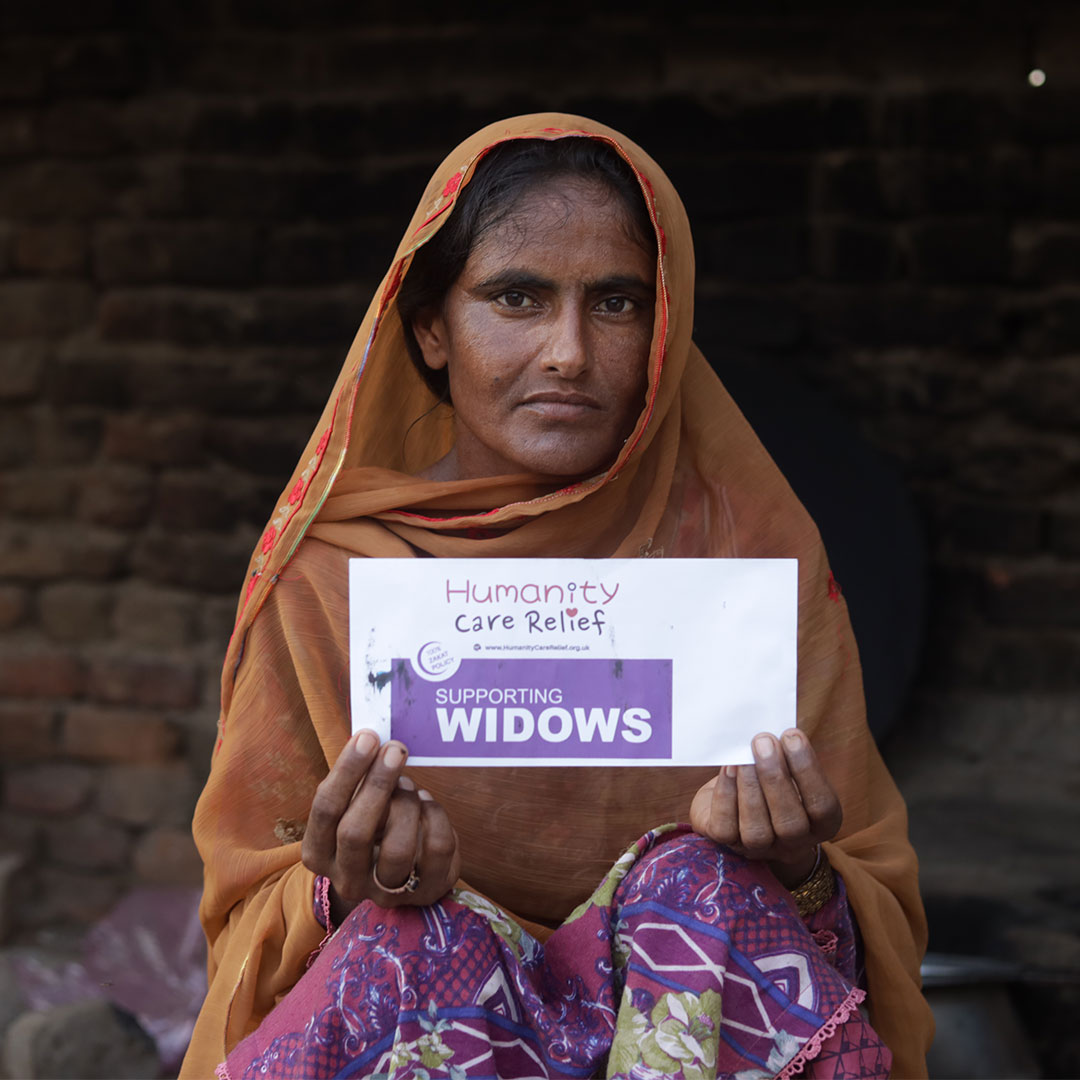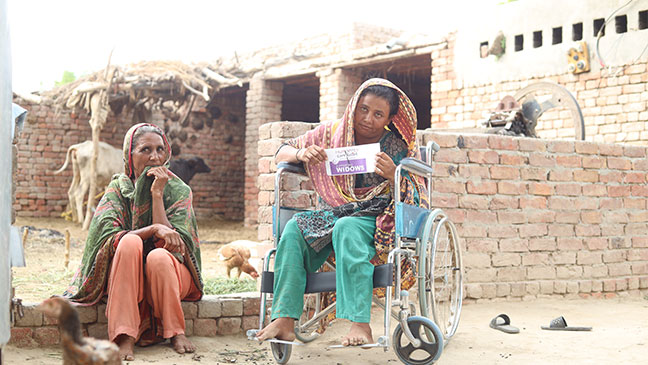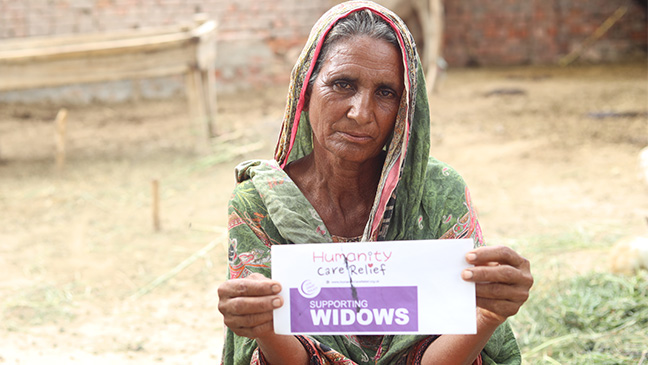Sponsor a Widow

Sponsor a Widow: Fulfiling an Islamic Duty with Compassion
In Islam, caring for widows is a noble act, deeply rooted in compassion and charity. Widows often face immense challenges, especially in communities where financial resources and social support are limited. Many struggle to provide for their children, facing both emotional and economic hardships. By sponsoring a widow, you fulfil a vital aspect of Islamic duty and embody the values of empathy and generosity. This support provides not only financial assistance but also a sense of hope and security, allowing widows to rebuild their lives with dignity and resilience. Join us in this blessed effort and make a meaningful difference in the lives of those most in need.

Who is a widow?
A widow is a woman whose spouse has died, resulting in the loss of the father of her children, her soulmate, financial support, and the guardian of her home. As a result of this loss, a widow is now responsible for taking on the full role of a single parent and caring for her children. This can lead to significant emotional and psychological suffering, impacting her mental health. The rights of women, including widows, are well documented in the Quran and Hadith.
Many widows with children live in refugee camps, rented homes, or temporary shelters with no support, no protection, and very little to eat. They are among the most vulnerable members of society. Without a breadwinner or male relatives in most cases, they often move from village to village, or town to town, seeking shelter and food.
What HCR is doing for Muslim Widows?
HCR is on the ground in Pakistan, Yemen, Syria, Gaza, Bangladesh, and many parts of Africa. We support hundreds of widows with food and financial aid on a regular basis. Sponsor a widow with HCR, add good deeds to your scale, and earn a place in Jannah.
When you sponsor a widow, you will be provided with regular reports on how the widow and her children are doing. You will also have the option to donate extra whenever you wish. For example, during Ramadan and Eid, you are welcome to send more donations.
The prophet said:
“The one who takes care of a widow or a poor person is like a ‘Mujahid’ fighting in the way of Allah…”
so don’t miss out on this opportunity.
Image: A widow who became disabled receiving her sponsorship allowance & wheelchair.
Struggles of Widows and Single Mothers
Globally, the number of single-mother households is at an all-time high. Statistics indicate that around 51% of single-mother families are led by women who are divorced, separated, or widowed. These situations often arise from unjust wars, chronic illness, and other circumstances.
Islam beautifully addresses every aspect of life, emphasising the responsibility of men to provide for and protect their life partners. However, when a woman becomes a single mother, she faces immense challenges. The weight of these responsibilities can be overwhelming, as she must care for her children, manage finances, and navigate life without a partner’s support. In such times, it is crucial for single mothers to maintain their well-being and find strength in their faith. By putting their full trust in Allah (SWT), they can navigate these challenges with resilience and hope.
Image: A widow receiving her sponsorship allowance. Sponsor a widow with HCR.
Islamic Financial and Social Rights for Widows
Allah says in the Quran:
“In that which your wives leave, your share is a half if they have no child; but if they leave a child, you get a fourth of that which they leave after payment of legacies that they may have bequeathed or debts. In that which you leave, their (your wives) share is a fourth if you leave no child; but if you leave a child, they get an eighth of that which you leave after payment of legacies that you may have bequeathed or debts. If the man or woman whose inheritance is in question has left neither ascendants nor descendants but has left a brother or a sister, each one of the two gets a sixth; but if more than two, they share in a third, after payment of legacies he (or she) may have bequeathed or debts so that no loss is caused (to anyone). This is a Commandment from Allah; and Allah is Ever All-Knowing, Most-Forbearing.”
(al-Quran 4:12)
Islam also permits widows to remarry, with specific guidelines to ensure their well-being. Following the death of her husband, a widow must observe an ‘iddah (waiting period) of four months and ten days. This period allows her to mourn, consider her future, and ensure she is not pregnant from her late husband before moving on with her life, including the possibility of remarrying. Marrying a widow is considered a noble act in Islam, following the example of Prophet Muhammad (peace and blessings be upon him), who married Khadijah (may Allah be pleased with her).
Allah says in Surah Al-Baqarah:
“And those of you who die and leave wives behind them, they (the wives) shall wait (as regards their marriage) for four months and ten days, then when they have fulfilled their term, there is no sin on you if they (the wives) dispose of themselves in a just and honourable manner (i.e. they can marry). And Allah is Well-Acquainted with what you do.”
(al-Quran 2:234)
Islam encourages widows to remarry, affirming that they have the right to continue their lives and pursue happiness. A widow does not lose her right to live fully after her husband’s death and may set new goals, including remarriage if she chooses.
Abu Huraira reported: The Messenger of Allah, peace, and blessings be upon him, said, “One who lends effort to the widows and the poor is like one waging jihad in the way of Allah, or one who regularly prays at night and fasts during the day.”
HCR – Help Alleviate Poverty
We are a UK-based international relief and development charity. Inspired by Islamic teachings of empathy, generosity, and selflessness, we focus on alleviating poverty and suffering across the world. We operate a 100% Zakat Policy, which means every single penny of your Zakat will go to the victims of poverty, wars, and natural disasters.
Before you support our Bangladesh Appeal, Food Appeal, Water Appeal, Gaza Emergency Appeal, Syria Emergency Appeal, Yemen Emergency Appeal, Pakistan Appeal, or any Emergency Appeal, remember to make the intention that you are donating for the sake of Allah first and helping your fellow Muslim brothers and sisters second. This is very important because as Muslims, whatever act of worship we do, we do it for the sake of Allah.
Along with our emergency appeals, we are working on some amazing projects which will, Insha’Allah, bring prosperity to many Muslim homes from around the world. Donate your Sadaqah and Zakat to our projects like Build a Masjid, Livelihoods for the Poor, Sponsor a Widow, Sponsor an Orphan, Sponsor a Nikah, Donate a Sewing Machine, or help educate the Ummah by donating towards education projects, Sponsoring a Hafiz, Sponsoring a Child in Education, or supporting young people in university and Islamic education. Donate with confidence, Insha’Allah, every penny of your donation is your Amanah, and we will try our best to spend it on people who are in need.
Every year, we as Muslims celebrate two seasons the most: one, Ramadan, and two, the first ten days of Dhul Hijjah. During these blessed days, we put all our efforts into pleasing Allah سُبْحَانَهُ وَتَعَالَى by performing good deeds. Here at HCR, we provide you with the platform to perform an important act of worship: charity. In Ramadan, you can donate to the Ramadan Food Appeal, and Ramadan Zakat Appeal, Donate Your Fidyah, Donate Your Fitrana, and Pay Your Kaffarah for Breaking Oath or Breaking Fast, especially during the blessed nights of Laylatul Qadr. In Dhul Hijjah, we are here to help fulfil your duty of performing Qurbani. Whichever cause you choose, choose it with confidence. Insha’Allah.


